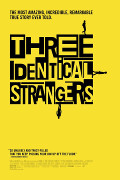
Directed by
Tim Wardle
96 minutes
Rated PG
Reviewed by
Bernard Hemingway

Three Identical Strangers
Synopsis: Identical triplets become separated at birth and are adopted by three different families who have no knowledge of each other. Two decades later they are united but eventually the disturbing facts behind their separation are revealed.
The first half of Tim Wardle’s documentary is given over to the story of Robert Shafran. Eddy Galland and David Kellman, triplets born in New York State in 1961 and given up immediately for adoption by their birth mother. We learn about the purely accidental circumstances of their reunion and their subsequent incarnation as talk-show circuit celebrities, partying hard, making a cameo appearance in Desperately Seeking Susan (1985) and milking their good fortune with a cheesy Soho eatery named Triplets to which tourists flocked in busloads to see the brothers in real life. .
All very good but despite the uplifting nature of the story we also get intimations every now and then that not everything is going to be a bowl of cherries.However this, it is almost unnecessary to point out, is where things not only get really interesting but also turn tragic.
It’s many years later and Lawrence Wright, a freelance journalist working on a story for the 'New Yorker' magazine about twins, accidentally unearths a connection between the adoption agency that placed the triplets in their new homes and a covert research project designed to explore, well we’re not exactly sure what because the results were never published and the raw data is under lock and key until 2066, but it might be the ongoing nature vs nature debate or more sinisterly, the heritability of mental illness.
Wardle, an Englishman who we occasionally hear in the background asking questions of his subjects, adopts an Errol Morris style of documentary film-making with lots of recreations and visual references that match the words being spoken by the talking heads. This tends to feel a little forced particularly in the early stages with a sense that we are being led in certain direction in the interests of dramatisation. Which we are, although once we pass the big turnaround Wardle eases up on the support material allowing his subjects to reveal an engrossing story which well and truly stands on its own merits, one that cuts across the grain of the feel-good first half of the story.
The choice of talking heads is judicious with the two psychologists actively involved in the study doing their profession no favours by either indifferently dismissing or inappropriately laughing off the naiveté of a time that considered such experiments perfectly acceptable (ironically so given that the principal architect of the study was a refugee from Nazi Germany) and the use of archival material similarly so. Oddly no mention is made of the fact that whilst as young men the brother indeed looked identical, now middle-aged they bear no more than a family resemblance to each other.
Like most good documentaries Three Identical Strangers both reveals a remarkable human story and encourages us to reflect on this extraordinary world in which we live.

Want more about this film?


Want something different?




